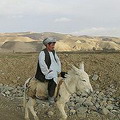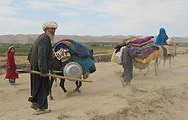 孩童的哭號劃破阿富汗修加拉河(Shulgara river)岸邊,一處帳篷城的愁苦天際。然而,即使這樣的嘶聲很快就會止息,因為即使哀嚎也無法阻止脫水、饑饉與疾病的逼迫,而最後只留下支離破碎的家庭。城內居民扎曼(Mohammad Zaman)說道,「過去當家裡有成員逝世,我們會為其舉行殯葬禮儀。不過現在自身難保,根本無暇照顧那些垂死的孩子。」
孩童的哭號劃破阿富汗修加拉河(Shulgara river)岸邊,一處帳篷城的愁苦天際。然而,即使這樣的嘶聲很快就會止息,因為即使哀嚎也無法阻止脫水、饑饉與疾病的逼迫,而最後只留下支離破碎的家庭。城內居民扎曼(Mohammad Zaman)說道,「過去當家裡有成員逝世,我們會為其舉行殯葬禮儀。不過現在自身難保,根本無暇照顧那些垂死的孩子。」
夏日炙熱的驕陽將河岸邊沙漠屯墾區的溫度竄升至攝氏40度以上,使得2,500餘戶的家庭民不聊生。自從春天的雨水遲至後,修加拉河已成為居民賴以維生的唯一飲用水源。然而,隨著氣溫不斷攀升,不但河水與溪流逐漸乾涸,井水水位亦降至最低界線。持續高漲的麥價讓一般家般甚至負擔不起最基本的糧食支出,在無餘力購買秣料的情況下,家畜一一死去,造成更大的損失
在紅新月會(Red Crescent)與阿富汗政府和當地商人的合作援助下,幫助流離的人們改善生活。不過人民卻反映這些作為的效果非常有限。2008年阿富汗境內旱災消息頻傳,尤以北部省份最為嚴重,特別是朱茲詹(Jowzjan)與法里亞布(Faryab)兩省,已經接近災難的程度。
沒有人可以精確地提供或測定問題的嚴重性。聯合國糧農組織(UNFAO)北阿富汗分會主席Mir Shafiuddin Mirzad指出,阿國無力建立可信的研究資料,導致災害問題更形嚴重,因為當地政府與國際援助組織無從了解災民確切需要什麼。
據法里亞布省長Abdul Haq Shafaq表示,西北地區有超過100,000個家庭正面臨迫在眉睫的險況。每天有上百名群眾來到辦公室請求援助,不過他卻無法提供什麼。薩爾伊普省(Sar-e-Pul province)的官員們更是擔心若再不改善問題,恐怕會釀成失控的糧食暴動。另一方面,議事專家Azita Rafat也形容到巴吉司省(Badghis)的慘況,由於乾旱的緣故,該省幾乎寸草不生,土地上幾乎不見任何牲畜和農作物的蹤影。
2007年6月,聯合國人道主義事務部副秘書長(Under Secretary General for Humanitarian Affairs)兼任緊急救護協調人(Emergency Relief Coordinator)赫姆斯(John Holmes)先生曾訪視喀布爾(Kabul)地區,並且針對危機的緊急情況,向媒體作一概略說明。他表示,「我們正與阿富汗政府合作,呼籲集結全球資源,以符合災區所需,同時處理農業在二十一世紀發展上的一些問題。」
 阿富汗農業部已宣佈一項緊急應變措施,將援助傳遞至各個受災省份。然而這些官方的承諾聽在飽受旱災之苦的人民耳裡,一切都是空談。
阿富汗農業部已宣佈一項緊急應變措施,將援助傳遞至各個受災省份。然而這些官方的承諾聽在飽受旱災之苦的人民耳裡,一切都是空談。
薩曼干省(Samangan)一名54歲的農夫Ekramuddin表示,「我的田地遍地乾涸,我也被逼得山窮水盡,所以打算到伊朗工作,只有這樣我才能寄些東西,讓我的家人可以安然渡過這個冬季。」另一名薩爾伊普的農民附和Ekramuddin的怨言載道,「政府總是一昧做出承諾,不過卻得等到我們前腳踏進饑荒的死亡之中,援助的後腳才剛抵至。」「我們的屍體要那些援助做什麼呢?因此,我們希望政府能在我們尚有氣息時,及時地幫助我們。」
The wailing of children pierces the air over the tent city on the banks of the Shulgara river. But even that sound may soon be stilled – so many children are dying of dehydration, starvation and disease that families no longer mark the occasion. “In the past, when a family member died, we would hold a mourning service,” said Mohammad Zaman. “But now all we can think of is ourselves. No one pays attention to children dying any more.”
With the fierce summer sun sending temperatures over 40 degrees Celsius, life is becoming untenable for the 2,500 families camped out in the desert that borders the river. The Shulgara has been their only source of potable water since the spring rains failed to arrive. Rivers and brooks have dried up in the scorching heat, and well water levels have sunk to record lows. Livestock are dying due to lack of fodder, while the soaring price of wheat and rice is making it difficult for families to purchase even the most basic foodstuffs.
The displaced people are receiving some help from the Red Crescent, along with assistance from the government and from local merchants. But they say it has been woefully inadequate. Much of Afghanistan has affected by drought this year, and the situation in the northern provinces, especially Jowzjan and Faryab, is approaching disaster.
No one has precise figures on the scale of the problem. Mir Shafiuddin Mirzad, who heads the United Nations’ Food and Agriculture Organization in northern Afghanistan, said that the lack of reliable survey data was creating serious problems, making it difficult to determine how much aid is needed, and of what type.
According to Abdul Haq Shafaq, the governor of Faryab province, more than 100,000 families in this northwestern region are in imminent danger. He said hundreds of people are coming to his office every day in hope of receiving assistance, but he has nothing to offer them. In Sar-e-Pul province, officials are fearful of food riots. Badghis has also been severely affected, according to parliamentarian Azita Rafat. She described an almost total loss of livestock and agricultural crops due to the drought.
In late June, the UN’s Under Secretary General for Humanitarian Affairs and Emergency Relief Coordinator, Sir John Holmes, paid a visit to Kabul and briefed journalists on the emerging crisis. “We are working together with the government of Afghanistan on a further, larger appeal to meet some of these needs and also to tackle some of the problems facing agriculture in this country,” Holmes said.
Afghanistan’s Ministry of Agriculture has announced an emergency plan to deliver aid to the affected provinces. But these promises ring hollow in the ears of the people most affected by the drought.
“All of my farmlands have dried up,” said Ekramuddin, 54, a farmer in Samangan province. “I have nothing left, so I am going to Iran to work so that I can send something to my family for the winter.” Abdul Ghani, a farmer in Sar-e-Pul, echoed Ekramuddin’s complaint. “The government always makes promises, but the assistance will be delivered to us after we’ve died of starvation,” he said. “What will our dead bodies do with that assistance? We urge the government to help us while we are still alive.”
全文及圖片詳見:ENS







